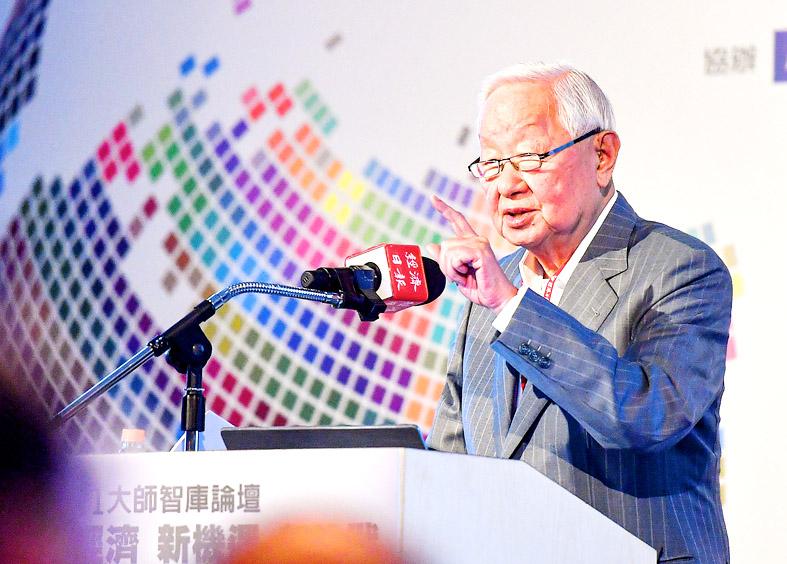Taiwan still leads the US and China in chipmaking, but it would be difficult for another local company to duplicate the success of Taiwan Semiconductor Manufacturing Co (TSMC, 台積電), the firm’s founder, Morris Chang (張忠謀), said on Wednesday.
Speaking at a seminar on Taiwan’s competitiveness in chip production, the 89-year-old Chang said that Taiwan’s talent pool of quality engineers, technicians and factory workers is the main reason it has excelled in the semiconductor foundry business.
Another factor is Taiwan’s transportation network, which allows large and quick transfers of personnel in the country, he said at the seminar hosted by the Economic Daily News.

Photo: CNA
Chang, who retired from TSMC in 2018, also lauded the company’s professional managers, saying their leadership and devotion to research and development, coupled with workers’ efforts, and government and local support, had helped TSMC evolve into a world-class company.
The US, on the other hand, saw a decline in manufacturing decades ago, and has been focusing instead on research and development, and the financial sector, he said.
Although the US government has been increasing funding for its semiconductor industry, Chang said that he is not worried, because production costs are significantly higher in the US than in Taiwan.
Short-term federal and state subsidies would do little to reverse the US’ competitive disadvantage in the long term, he said.
China has spent tens of billions of dollars over the past 20 years to nurture its domestic companies, but their semiconductor manufacturing process lags behind TSMC’s by at least five years, and their logic IC design is also one to two years behind that of Taiwan and the US, he added.
Samsung Electronics Co is TSMC’s only strong competitor, because South Korea also has a vibrant manufacturing sector and a competitive talent pool similar to Taiwan’s, he said.
Despite Taiwan’s advantage in the semiconductor industry, it would not be easy for another domestic firm to duplicate TSMC’s role as the world’s leading dedicated semiconductor foundry and a protective shield that underpins Taiwan’s economy, Chang said.
“It will be difficult” to find another company that is so important to the rest of the world and holds such a large global market share and competitive edge, he added.
Founded in 1987 by Chang as a chip foundry business, TSMC has become enormously important, as the global information technology sector is highly dependent on its products.
It has been called a “protective sacred mountain” for Taiwan against China, amid Beijing’s technology dispute with Washington.
Semiconductor wafer manufacturing is extremely important to people’s livelihood, the economy and national defense, Chang said.
Last year, TSMC’s market capitalization topped US$600 billion, the highest among semiconductor companies.

RECYCLE: Taiwan would aid manufacturers in refining rare earths from discarded appliances, which would fit the nation’s circular economy goals, minister Kung said Taiwan would work with the US and Japan on a proposed cooperation initiative in response to Beijing’s newly announced rare earth export curbs, Minister of Economic Affairs Kung Ming-hsin (龔明鑫) said yesterday. China last week announced new restrictions requiring companies to obtain export licenses if their products contain more than 0.1 percent of Chinese-origin rare earths by value. US Secretary of the Treasury Scott Bessent on Wednesday responded by saying that Beijing was “unreliable” in its rare earths exports, adding that the US would “neither be commanded, nor controlled” by China, several media outlets reported. Japanese Minister of Finance Katsunobu Kato yesterday also

Jensen Huang (黃仁勳), founder and CEO of US-based artificial intelligence chip designer Nvidia Corp and Taiwan Semiconductor Manufacturing Co (TSMC, 台積電) on Friday celebrated the first Nvidia Blackwell wafer produced on US soil. Huang visited TSMC’s advanced wafer fab in the US state of Arizona and joined the Taiwanese chipmaker’s executives to witness the efforts to “build the infrastructure that powers the world’s AI factories, right here in America,” Nvidia said in a statement. At the event, Huang joined Y.L. Wang (王英郎), vice president of operations at TSMC, in signing their names on the Blackwell wafer to

‘DRAMATIC AND POSITIVE’: AI growth would be better than it previously forecast and would stay robust even if the Chinese market became inaccessible for customers, it said Taiwan Semiconductor Manufacturing Co (TSMC, 台積電) yesterday raised its full-year revenue growth outlook after posting record profit for last quarter, despite growing market concern about an artificial intelligence (AI) bubble. The company said it expects revenue to expand about 35 percent year-on-year, driven mainly by faster-than-expected demand for leading-edge chips for AI applications. The world’s biggest contract chipmaker in July projected that revenue this year would expand about 30 percent in US dollar terms. The company also slightly hiked its capital expenditure for this year to US$40 billion to US$42 billion, compared with US$38 billion to US$42 billion it set previously. “AI demand actually

RARE EARTHS: The call between the US Treasury Secretary and his Chinese counterpart came as Washington sought to rally G7 partners in response to China’s export controls China and the US on Saturday agreed to conduct another round of trade negotiations in the coming week, as the world’s two biggest economies seek to avoid another damaging tit-for-tat tariff battle. Beijing last week announced sweeping controls on the critical rare earths industry, prompting US President Donald Trump to threaten 100 percent tariffs on imports from China in retaliation. Trump had also threatened to cancel his expected meeting with Chinese President Xi Jinping (習近平) in South Korea later this month on the sidelines of the APEC summit. In the latest indication of efforts to resolve their dispute, Chinese state media reported that